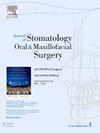将机器学习与基于网络的工具相结合,对口腔腺样囊性癌进行个性化预后分析。
IF 1.8
3区 医学
Q2 DENTISTRY, ORAL SURGERY & MEDICINE
Journal of Stomatology Oral and Maxillofacial Surgery
Pub Date : 2024-11-08
DOI:10.1016/j.jormas.2024.102143
引用次数: 0
摘要
背景:口腔腺样囊性癌(ACC)是一种罕见的头颈部癌症:口腔腺样囊性癌(ACC)是一种罕见的头颈部癌症。这种罕见性导致对这种癌症的综合研究很少,从而使循证治疗策略的制定变得复杂。本研究旨在利用机器学习(ML)技术分析 ACC 的生存结果并优化治疗方法:本研究使用了 SEER 数据库(2000-2020 年)。方法:本研究使用 SEER 数据库(2000-2020 年),采用 Cox 回归分析确定预后变量;使用五种 ML 算法构建预后模型,预测 5 年生存率。研究采用接收者操作特征曲线(ROC)曲线下面积(AUC)的验证方法来验证 ML 模型的准确性和可靠性。此外,还进行了 Kaplan-Meier 生存分析:本研究的样本包括 645 名患者。ACC最常见的原发部位是硬腭,其次是颊粘膜。不同治疗组的存活率各不相同,仅接受手术治疗的患者存活率最高。ML模型显示,最重要的预后因素是年龄、转移和手术:本研究为有限的 ACC 文献提供了证据和知识,并强调了辅助放疗的重要性。本研究强调,转移和年龄是关键的预后因素。此外,所开发的基于 ML 的网络工具为这些罕见癌症类型的个性化预后提供了一种新方法。本文章由计算机程序翻译,如有差异,请以英文原文为准。
Integrating machine learning with web-based tools for personalized prognosis in oral adenoid cystic carcinoma
Background
Adenoid cystic carcinoma (ACC) of the oral cavity is a rare head and neck cancer. This rarity contributes to the paucity of comprehensive research on this cancer thereby complicating the development of evidence-based treatment strategies. This study aims to use machine learning (ML) techniques to analyze survival outcomes and optimize treatment approaches of ACC.
Methods
The SEER database (2000–2020) was used in this study. Cox regression analysis was used to identify the prognostic variables; prognostic models using five ML algorithms were constructed to predict the 5-year survival rates. A validation method incorporating the area under the curve (AUC) of the receiver operating characteristic (ROC) curve was used to validate the accuracy and reliability of ML models. Also, Kaplan-Meier survival analysis was performed.
Results
This study's sample included 645 patients. The most common primary site for ACC was the hard palate, followed by the cheek mucosa. Survival rates varied across treatment groups, with the highest rates observed in patients who underwent surgery only. ML models revealed that the most significant prognostic factors were age, metastasis, and surgery.
Conclusions
This study contributes evidence and knowledge to the limited literature on ACC and emphasizes the importance of adjuvant radiotherapy. This study highlights that metastasis and age are key prognostic factors. Furthermore, the developed ML-based web tool offers a novel approach for the personalized prognosis of these rare cancer types.
求助全文
通过发布文献求助,成功后即可免费获取论文全文。
去求助
来源期刊

Journal of Stomatology Oral and Maxillofacial Surgery
Surgery, Dentistry, Oral Surgery and Medicine, Otorhinolaryngology and Facial Plastic Surgery
CiteScore
2.30
自引率
9.10%
发文量
0
审稿时长
23 days
 求助内容:
求助内容: 应助结果提醒方式:
应助结果提醒方式:


